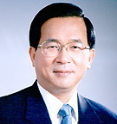Given the way events have been unfolding around Taiwanese President Chen Shui-bian, one could understand why he might have simply wanted to go home. On Sept. 9, Chen went to his hometown in Taiwan's Tainan County, a Democratic People's Party (DPP) stronghold, to meet with a group of faithful supporters. The storm, meanwhile, was in the capital Taipei, more than 350 kilometers away, where tens of thousands of angry demonstrators, many dressed in red to reflect their outrage, gave Chen the thumbs-down during a sit-in outside the presidential palace. In Tainan County, Chen encountered a sit-in as well, but this one was in support of him and his administration. In the capital, demonstrators charged through downtown Taipei, using Chen's nickname while yelling "A-bian sucks;" in his hometown, sky lanterns were released and the president was accompanied by his mother while speaking to an adoring crowd. Indeed, one could understand if Chen didn't want to leave home after this. For a man used to taking an awful lot of flak on an almost daily basis, the mass rally in Taipei involving either 200,000 (organizer estimate) or 90,000 (police estimate) people nevertheless marked a new low in the political career of Chen Shui-bian. There is no doubt that he is widely unpopular: a China Times poll in August showed that 54 percent of Taiwan wanted him to resign, while Xinhua cited a figure of 68.5 percent from a poll by an unnamed Taiwanese newspaper; support for Chen is at 10 percent according to an August poll by TV station TVBS, down from 70 percent when Chen was first elected in 2000. Chen's troubles, however, don't end with the poor ratings. As Taiwan scrambles to hold on to its handful of allies under the looming shadow of China, fresh allegations of paying money in exchange for diplomatic ties have also surfaced. More damagingly, he and his inner circle face probe after probe on a variety of corruption charges, ranging from insider trading to accepting department store coupons, which could really submerge his now fast-sinking ship. Things had seemed so much better barely a week earlier. On Sept. 3, Chen flew to the tropical island paradise of Palau on the Taiwanese presidential jet, becoming the first leader of Taiwan in five decades to use the official aircraft. Palau, location of the first annual Taiwan-Pacific Allies Summit, was where Chen won a fishing competition along with Palauan President Tommy Remengesau after landing a haul of 11.3 kilograms. From there he headed to Nauru, becoming, as he proclaimed, the first Taiwanese leader to set foot on Nauruan soil. All this while, however, the storm clouds were gathering. Of the 24 countries having diplomatic ties with Taiwan, exactly a quarter are located in the South Pacific; with Chad having switched allegiance to China in August, the summit was necessary to prevent others from following suit. Chen also had his personal track record to think of: After all, he had lost 7 allies since coming to power in 2000, including key South Pacific nation Vanuatu.
Chen and the Art of Unpopularity

